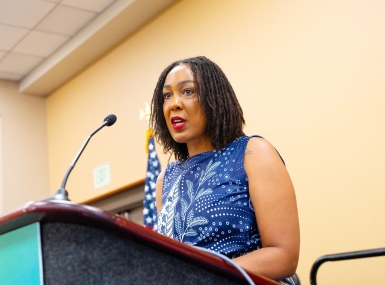Congress moves on CHIP, other health safety net bills
Upcoming Events
Related News

Funding for CHIP may come at the expense of Prevention and Public Health Fund, which supports counties
Sept. 30 marked the final day of FY 2017, and with it, the expiration of funding for a number of federal health programs, including Children’s Health Insurance Program (CHIP) and community health centers and disproportionate share hospitals (DSH). CHIP was last reauthorized for two years under the Medicare Access and CHIP Reauthorization Act of 2015. The bill funded CHIP for FY 2016 and FY2017 at approximately $13.9 billion and $15.9 billion, respectively.
Learn More
For more NACo resources on health care programs, please see the following:
Policy Brief: Protect funding for core local public health services and prevention programs
Senate Finance Committee introduces CHIP reauthorization bill
Across the Capitol, the House Energy and Commerce Committee moved legislation to reauthorize multiple health programs, including CHIP and community health centers. Its bill to reauthorize CHIP, the Helping Ensure Access for Little Ones, Toddlers, and Hopeful Youth by Keeping Insurance Delivery Stable (HEALTHY KIDS Act of 2017 (H.R. 3921), would reauthorize CHIP for five years, and also contains other provisions delaying the scheduled cuts to DSH payments by one year and providing $1 billion in Medicaid funds to Puerto Rico. Offsets include charging higher Medicare premiums to wealthier seniors and allowing states to dis-enroll lottery winners from the Medicaid program.
The House Energy and Commerce Committee also approved a separate piece of legislation, the Community Health and Medical Professionals Improve Our Nation Act (CHAMPION Act) of 2017 (H.R. 3922), which would reauthorize community health centers for two years, in addition to other health programs.
However, the bill’s expense would be offset by a $6.35 billion cut in future appropriations to the Prevention and Public Health Fund. The PPHF provides approximately $900 million annually in support of state and local public health and prevention efforts, including activities such as immunizations and diabetes prevention efforts. This federal funding source is extremely important to the nation’s 2,800 local public health departments, two-thirds of which are county-based.
NACo supports congressional efforts to extend CHIP, community health centers, scheduled cuts to DSH payments and other health safety net programs, but strongly opposes efforts to cut federal funding for the Prevention and Public Health Fund. Cuts to this fund would be a blow to already-strained county public health departments and inhibit their ability to implement activities that keep their residents healthy and safe.
If Congress is not able to pass legislation to extend funding for these programs over the next few months, they could attach these into a must-pass legislative package when the continuing resolution and debt limit extension expires Dec. 8. NACo will continue to monitor legislative developments and their potential impact to counties.
Attachments
Related News

CMS releases details on the Rural Health Transformation Program
On September 2, the Centers for Medicare & Medicaid Services (CMS) released additional details on the Rural Health Transformation (RHT) Program, overviewing program goals, requirements and timelines.

Counties encouraged to apply for newly established HHS Healthcare Advisory Committee
On August 22, the U.S. Department of Health and Human Services (HHS) announced the creation of a new Healthcare Advisory Committee, aimed at providing expert guidance on pressing healthcare challenges. This new committee represents an important opportunity for counties to have a voice in shaping federal healthcare policy.

Engaging people with ‘lived experience’ helps build substance use disorder programming
Philadelphia’s Keli McLoyd noted to NACo's Health Steering Committee that increased harm reduction initiatives have led to fewer drug overdose deaths.